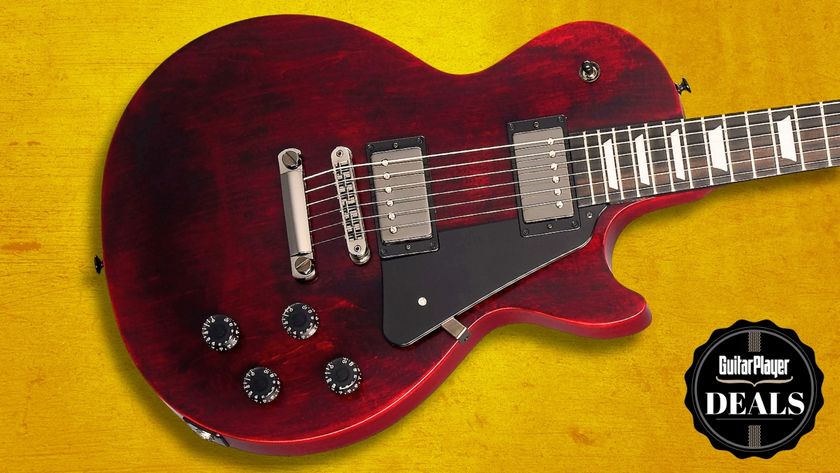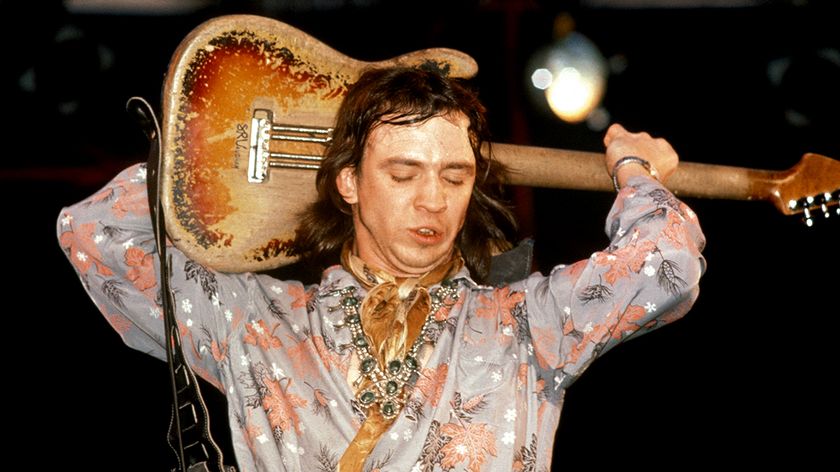Best Desktop Guitar Amps 2025: Great Space-Saving And Portable Picks From Boss, Blackstar And More
Looking for a compact, portable guitar amp without sacrificing quality? Here are the best options on the market from Yamaha, Blackstar, Positive Grid and more
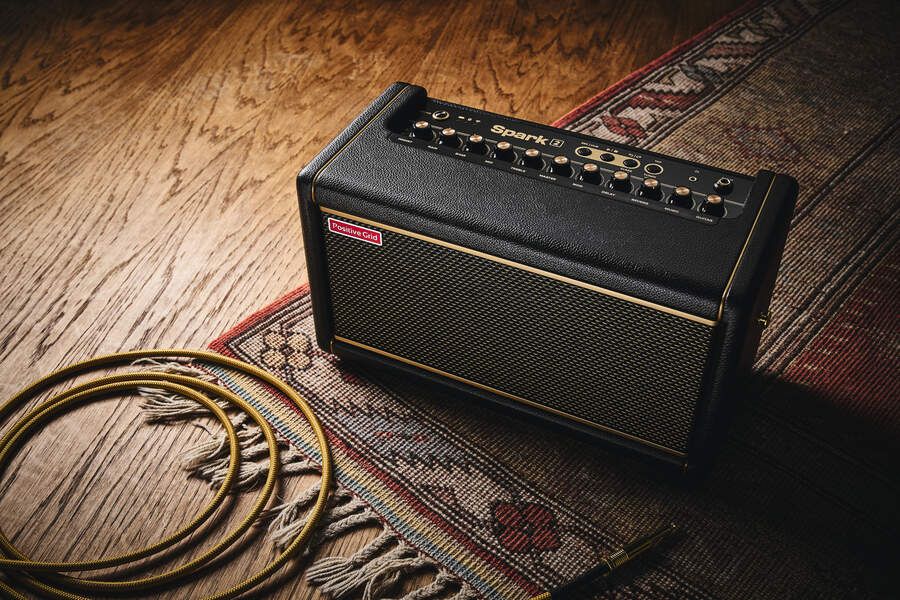
For most players, a stack of Marshall amps is more likely to get complaints from neighbors and roommates than applause – no matter how spot-on your rendition of Layla might be. If that sounds familiar, the best desktop guitar amps are your ticket to channeling your inner Clapton at a more neighbor-friendly volume. These compact powerhouses aren’t just about keeping the peace – they’re often packed with cutting-edge tech, controllable from devices letting you tweak effects chains, experiment with head and cab combos, and even double as an interface for recording.
Designed to fit perfectly on your desk, these amps are lightweight, portable, and versatile enough to accompany you anywhere, whether that's to a friend’s house for a jam, a weekend getaway, or even your lunch break in the office. In fact, desktop amps have become so practical that the only time I’ve found myself reaching for a tube amp lately is during band practice or gigs.
With brands like Yamaha, Blackstar, and Positive Grid continuously pushing the envelope, there’s no shortage of incredible options in this category. Drawing on over a decade of experience in the industry, I’ve narrowed it down to the eight best desktop amps you can buy right now.
Our top picks
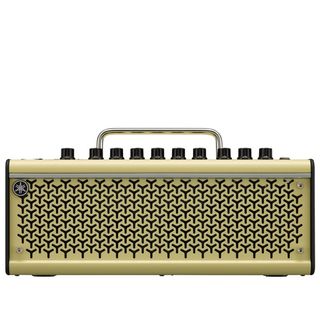
The THR range from Yamaha is a stalwart in the desktop amp category. The first version launched all the way back in 2011, and 15 years later, the second iteration continues to impress. The THR10II has 20 watts of power, enough built-in effects to give a pedalboard a run for its money and the capability to amplify electric, acoustic and bass guitar.
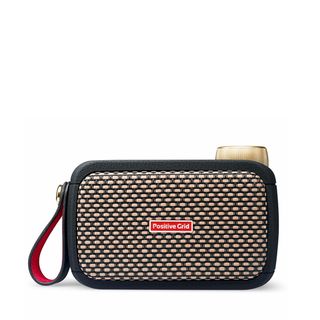
Positive Grid prides itself on delivering practical, feature-packed, technologically driven amplifiers for guitarists, and the Spark Go is no exception. This pocket-sized amp is a spark – excuse the pun – for creativity and inspiring practice. Weighing only 346 grams and equipped with a 2-inch custom-designed speaker, you can toss it in your gig bag and play whenever inspiration strikes.
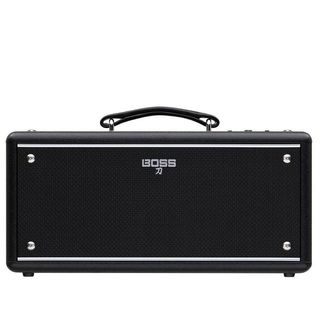
A best amplifier guide would be incomplete without a Katana product, and for this particular category, the Katana-Air EX is Boss’ best-in-class desktop option. The EX version is slightly larger than the original Air and features two prominent upgrades: two specially designed 5-inch speakers and a ported wooden cabinet.
Best Overall
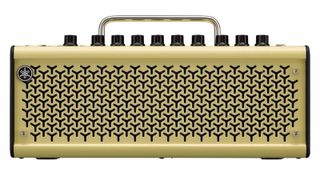
1. Yamaha THR10II
Our expert review:
Specifications
Reasons to buy
Reasons to avoid
The THR range from Yamaha is a stalwart in the desktop amp category. The first version launched all the way back in 2011, and 15 years later the second iteration continues to impress. The THR10II has 20 watts of power, enough built-in effects to give a pedalboard a run for its money and the capability to amplify electric, acoustic and bass guitar.
Unlike other desktop amps, the THR10II impresses with its responsiveness to your playing. It performs well above its ‘desktop amp’ categorization and those used to tube amplifiers will appreciate the THR’s behaviors. Even the dual 3.1-inch speakers do a fantastic job of dispersing your sound, with a richness that is usually devoid in amplifiers this small. Sure, the small speakers can struggle if you blast the volume and gain, but at a general bedroom level, it sounds great.
Like any desktop amp worth its salt, the THR10II can be connected to Yamaha’s proprietary app for tone editing, signal chain tweaking, saving tones and accessing an additional compressor and noise gate. For its compact size, amp-like tone and numerous features, the THR10II remains one of the top options in the desktop amp category.
Best compact
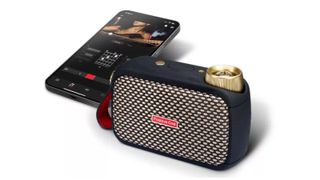
Specifications
Reasons to buy
Reasons to avoid
Positive Grid prides itself on delivering practical, feature-packed, technologically driven amplifiers for guitarists, and the Spark Go is no exception. This pocket-sized amp is a spark – excuse the pun – for creativity and inspiring practice. Weighing only 346 grams and equipped with a 2-inch custom-designed speaker, you can toss it in your gig bag and play whenever inspiration strikes.
Borrowing from others in the Spark range, the Go is compatible with the free Spark app. Here’s where the amp truly shines, allowing tone editing from a range of 33 different amplifiers and 43 effects, giving you almost everything its bigger siblings offer.
Other features include Bluetooth compatibility, meaning it doubles as a wireless speaker when you want to put the guitar down and listen to the professionals. With a USB-C connector, it can also serve as an interface if needed, while the headphone output ensures quiet practice. As for the build, Positive Grid’s thoughtful design is present throughout – the rounded edges, recessed controls and soft detents on the control panel give it a premium feel.
Read the full Positive Grid Spark Go review
Best wireless
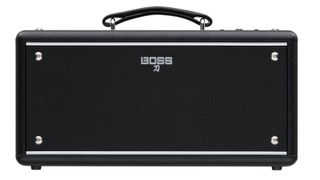
3. Boss Katana-Air EX
Our expert review:
Specifications
Reasons to buy
Reasons to avoid
A best amplifier guide would be incomplete without a Katana product, and for this particular category, the Katana-Air EX is Boss’ best-in-class desktop option. The EX version is slightly larger than the original Air and features two prominent upgrades: two specially designed 5-inch speakers and a ported wooden cabinet.
The EX delivers 30 watts through its stereo speakers, offering more than enough volume for home practice or casual jamming. While it may not have the raw output to keep up with a drummer in a live band setting, it shines in smaller jam sessions and personal use. Plus, Boss’ wireless transmitter makes cable-free play an absolute joy. We’ve experienced no latency issues, and with 12 hours of playtime before needing a charge, it’s perfect for extended practice.
Like other Katanas, the Air EX comes loaded with over 60 of Boss’ iconic effects and five amp voices, covering everything from sparkling cleans to saturated leads. It even supports acoustic guitar and bass. If you need more flexibility for a band or performance, the stereo line output with mic’d cab emulation allows you to connect it directly to a PA or recording console – showing how this desktop amp can bridge the gap between home and venue use.
Best classic tones
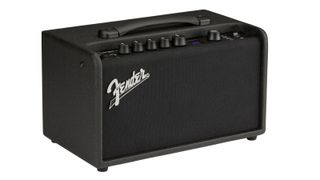
4. Fender Mustang LT40S
Our expert review:
Specifications
Reasons to buy
Reasons to avoid
With the Mustang LT40S, Fender takes a slightly different approach. While many competitors are leaning into smartphone integration and app-based control, the Mustang LT40S stands out as a more self-contained option. It’s perfect for players who want a desktop amp that’s plug-and-play, without constantly reaching for their phone.
Featuring a built-in 1.8-inch screen, the LT40S offers 25 effects and 20 amp voices, all designed to be controlled directly on the amp. Sure, you can upload patches via a USB connection and the Fender Tone desktop app, but this amp doesn’t depend on it. Most of the heavy lifting can be done right from the amp, thanks to the large rotary knob that controls the screen and an easily accessible EQ section.
When it comes to amp voices, the LT40S shines with those iconic Fender tones. The Bassman, Champ, Deluxe, Princeton and Twin models all deliver an excellent foundation for layering effects. With 40 watts of power and two 4-inch speakers, there’s plenty of volume on tap. The wooden cabinet adds depth and richness to the tone, giving it an edge over other desktop amp options. While it doesn’t include Bluetooth capabilities, for its attractive price point, that’s hardly a deal breaker.
Best features
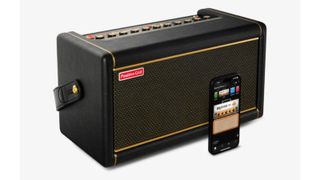
5. Positive Grid Spark 2
Our expert review:
Specifications
Reasons to buy
Reasons to avoid
The original Spark garnered over 25,000 pre-orders when it was first introduced to the guitar world, so expectations for its follow-up were understandably high. While the second iteration closely resembles the original in appearance, most of the upgrades are under the hood. That said, the most notable aesthetic change is the control panel, which now features a newly installed looper – a welcome addition in our eyes.
The Spark 2 is now more powerful, with 50 watts of output compared to the original’s 40 watts. The new DSP amp-modeling engine handles user tweaks and adjustments more effectively, while the improved FRFR speakers offer clearer sound and an excellent platform for patches. Positive Grid has also improved the AI features within the app. Simply describe the tone you're after – such as a warm, rich vintage overdrive – and the app will generate a custom patch tailored to your request.
On top of that, the Spark 2 includes all the connectivity options you need: Bluetooth, a new stereo line output, and a USB-C option for using the amp as an interface. All in all, the Spark 2 is the ultimate home practice tool and an excellent sequel to the original.
Best on a budget
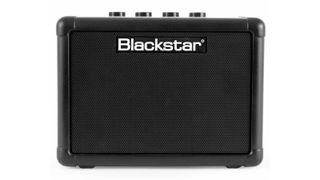
6. Blackstar Fly 3
Our expert review:
Specifications
Reasons to buy
Reasons to avoid
Emerging from the ranks of ex-Marshall employees, Blackstar has made a name for itself in the world of amplification. From versatile tube amps to affordable practice options, the Fly 3 is a standout in the budget desktop amp category.
This compact little amp is perfect for those who want to keep costs low without sacrificing a decent tone. Powered by a 3-inch speaker and 3 watts of power, it manages to deliver surprisingly clear sound that punches well above its weight. The big appeal of the Fly 3, however, is its size – you can take it just about anywhere. Whether you’re practicing at work, on holiday, or even on the bus, it’s battery-powered, so it’s truly portable.
The layout is simple and effective, with controls for gain, volume, built-in delay, and Blackstar’s patented ISF control, which lets you switch between classic American or British amp tones. There is even an overdrive channel for a bit of extra grit, alongside the clean channel. Not to be outdone by larger amps, Blackstar has included an emulated line-out for recording and an aux-in for jamming along to tracks.
Best with Bluetooth
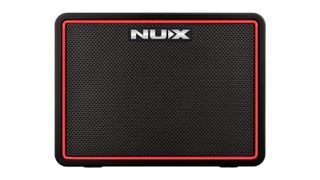
7. NUX Mighty Lite BT MKII
Our expert review:
Specifications
Reasons to buy
Reasons to avoid
NUX has long been known for producing high-quality, affordable products that pack in modern features that other brands often charge a premium for. The Mighty series of amps is a prime example, and the Mighty Lite BT MKII stands out as one of the best desktop amp options in the range.
This compact desktop amp packs 3 watts of power – perfect for home use – and offers the convenience of both battery and DC power. However, where the Mighty Lite BT MKII truly comes to life is when paired with the MightyAmp app and Mighty Editor.
The app puts hands-on control in your grasp, offering over 21 different amp voices and the ability to manipulate 7 different effects blocks: reverbs, delays, modulations, overdrives and more.
You can choose different jam tracks and adjust the built-in drum machine, all from the app. If you’re feeling stuck for inspiration, a bank of user presets is available for free, and saving your own presets to the amp’s toggle button is simple and intuitive.
Best FRFR
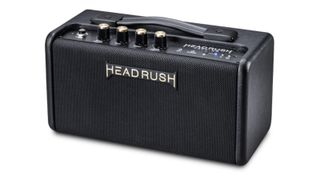
8. HeadRush FRFR-GO
Our expert review:
Specifications
Reasons to buy
Reasons to avoid
HeadRush is always innovating, there is no doubt. The FRFR-GO sees the company blend two fairly new amp categories – desktop amps and FRFR speakers. Designed as a compact, no-compromise option, the FRFR-GO delivers a solid 30 watts of sound through its dual 3-inch custom speakers, making it an excellent choice for home practice and smaller spaces.
Despite its small form factor compared to other FRFR options, this desktop-sized amp doesn’t skimp on functionality. It features Bluetooth streaming, allowing you to jam along to your favorite tracks, while its intuitive control panel provides easy access to EQ adjustments. As a space-saving, portable amplifier, the FRFR-GO is ideal for casual play, practice, and use with amp modelers or effect units.
What truly sets the FRFR-GO apart is its seamless integration with modelers, delivering your favorite tones at lower volumes without compromise. Its portability is further enhanced by a 13-hour battery life, making it a fantastic travel companion. Whether you’re heading to a holiday home, the office, or even on a trip, just pack your travel guitar and modeler, and you’re ready to play.
FAQs
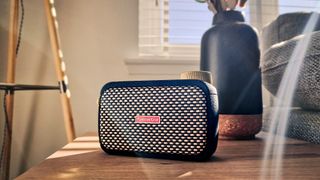
What is a desktop amp?
While it may seem straightforward, the line between desktop amps, practice amps, and modeling amps can sometimes blur. The main distinguishing factor of a desktop amp is its compact size and portability. For instance, popular modeling amps like the Katana-50 are great for home use but are far too large to comfortably sit on your studio desk. In contrast, a proper desktop amp is small enough to sit neatly on your desk while still being lightweight enough to take with you wherever you go.
Although desktop amps may offer similar features to digital modeling amps – such as built-in effects, amp voices and attenuators – they often place a greater emphasis on connectivity with smartphones and computers. Because of their small form factor, desktop amps don’t have as many physical controls, making it common to control and adjust settings via a connected device.
What size of desktop amp do I need?
Desktop amps come in a range of sizes, with the largest currently being the Positive Grid Spark 2 at 50 watts. The ideal size for your desktop amp will largely depend on how you plan to use it and the environment in which you'll be playing. For instance, if your main purpose is personal practice at home, then a 3-watt model will be more than enough.
However, if you’re thinking of taking your desktop amp over to a friend’s house for a jam session, you may want to opt for something with 40 or 50 watts for a bit more power. Since desktop amps generally feature smaller speakers than traditional amps, they can sometimes struggle to handle very loud volumes. If you're planning to use it in a practice space with a drummer, be cautious with volume levels. For more versatility, look for a desktop amp with stereo outputs that can be used in larger spaces or for direct input into a mixing desk.
What brand makes the best desktop ampifier?
As with any emerging trend in the guitar world, brands are quick to jump in and compete for market share. That said, Positive Grid has remained at the forefront of the desktop amplifier scene since the release of the original Spark. With 25,000 pre-orders for the first model, it’s clear that the Spark struck a chord with players. The latest iteration, the Spark 2, builds on its predecessor’s success with thoughtful upgrades, and now the brand offers a diverse range, from compact options to full FRFR solutions.
Yamaha has earned its place in the spotlight as well, with the THR series continuing to impress since the launch of the original model in 2011. The range has expanded over time, now offering multiple models, including wireless options. Boss has also made a mark by extending its popular Katana line to include the desktop-friendly Katana-Air EX, bringing classic effects in a compact package. And for those seeking authentic, vintage-inspired amp sounds, Fender’s LT40S offers iconic Twin, Deluxe and Princeton tones, all in a reasonably priced desktop unit.
Related buyer's guides
- Plug in with one of the best guitar cables
- Save cash on the best electric guitars under $500
- Play away the blues with our pick of the best blues guitars
- Freshen up your tone with the best electric guitar strings
- Take your playing to new heights with the best online guitar lessons
Get The Pick Newsletter
All the latest guitar news, interviews, lessons, reviews, deals and more, direct to your inbox!
Ross has been a music lover and guitar player since the age of 8. He has spent the five years since graduating from university working in music retail, selling guitars, amps and more. Ross is particularly interested in electric guitars, pedals and amplifiers and his current rig includes a trusty 2009 American Standard Stratocaster and Vox AC30S1 with a few Walrus Audio and Way Huge pedals in between. He currently writes for Guitar Player and Guitar World.

